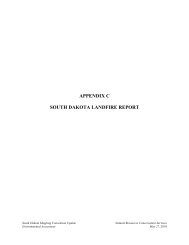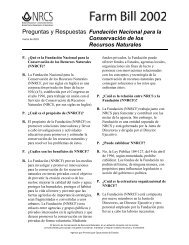The Ozette Prairies of Olympic National Park - Natural Resources ...
The Ozette Prairies of Olympic National Park - Natural Resources ...
The Ozette Prairies of Olympic National Park - Natural Resources ...
You also want an ePaper? Increase the reach of your titles
YUMPU automatically turns print PDFs into web optimized ePapers that Google loves.
to the sky and tried to obtain the right medicine, such as baby lizards, baby suckers and baby squirrels.<br />
(5:30)<br />
Hal George told that “people used to carry pretty stones or a bone or shell they found where they had<br />
good luck. <strong>The</strong>y also carried a little carving <strong>of</strong> their spirit guardian if it was something they’d seen like a<br />
little elk with great big horns” (NB 1978.1, p.40).<br />
Personal Cleanliness - Personal cleanliness was especially important to traditional Quileute. Hal George<br />
expressed it like this: “Bathing was important, especially when you wanted to get in a right relationship<br />
to your spirit power. Scrub your body with fine sand and then coarse until it bleeds. Spirits don’t like<br />
unclean people and won’t come around. <strong>The</strong>y wouldn’t come near you if you weren’t really clean, in<br />
your heart and outside. Lucky people were always scrubbing in streams” (NB 1978.1, p.47). Hal used to<br />
bathe before going hunting. We can see how this practice related to subsistence activities, since a hunter<br />
or gatherer’s success was so clearly related to the help <strong>of</strong> that person’s taxilit ‘spirit power’.<br />
Summary: Traditional Quileute Perspective on Prairie Stewardship Obligation. For traditional Quileute,<br />
then, we can suggest that stewardship behavior would be appropriate actions and activities that maintain<br />
the prairies and allow them to be exploited without waste or disrespect that would <strong>of</strong>fend the spirits.<br />
This attentiveness to ingratiating the spirit world as a factor in traditional Quileute folk science leaves me<br />
uncertain as to the logic behind stewardship activities in the prairies. It is clear that the old people were<br />
aware <strong>of</strong> the cause and effect relationship <strong>of</strong> regular burning to keeping the prairies open. <strong>The</strong> question is<br />
whether they were primarily motivated by this realization <strong>of</strong> useful ecological cause and effect or whether<br />
the focal motivation was spiritual. An example might help clarify the distinction.<br />
In 1968, I was invited to go out collecting seagull eggs by Hal George and Harvey James, two old men<br />
who had been to school but who were taLayikila potsoqw, ‘oldtime people.’ We went by outboard boat,<br />
pulling a canoe to an island south <strong>of</strong> La Push. Reaching the island, where hundreds <strong>of</strong> seagulls were nesting,<br />
Hal and Harvey got out and, talking appeasingly to the seagulls that were angrily screeching and<br />
diving at them, they walked around the island and stepped on every egg on the island…crunch, crunch,<br />
crunch. <strong>The</strong>n we got back in the boat and went to Queets for two days, visiting friends <strong>of</strong> Hal’s. On the<br />
morning <strong>of</strong> the third day, we went back to the island and, after singing a song <strong>of</strong> praise to T’siq’ati, collected<br />
every egg on the island until the canoe that we were pulling behind was full <strong>of</strong> eggs. When I asked<br />
the men, “Why do you break all the eggs?” <strong>The</strong>ir response was that by breaking the eggs first is the only<br />
way that they can be sure that the eggs they actually collect are fresh. But, when I persisted, “<strong>The</strong>re won’t<br />
112
















